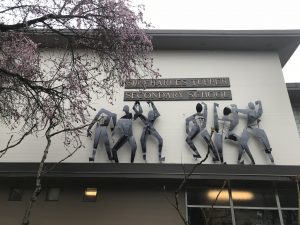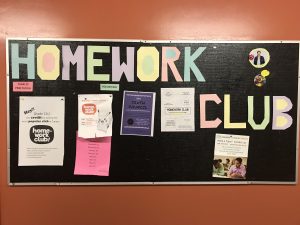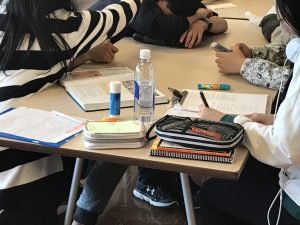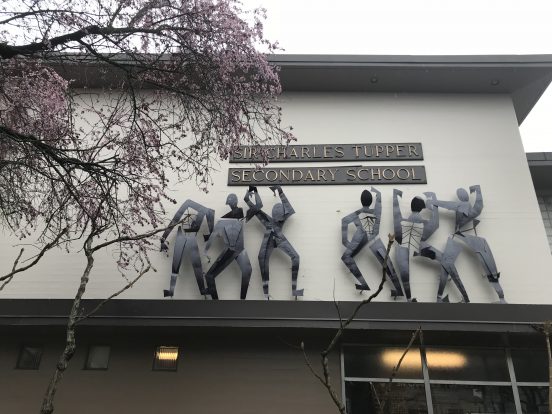By Jessica Wang Placement: Littler Mountain Neigbourhood House – Sir Charles Tupper Secondary School
The Homework Club at Sir Charles Tupper Secondary School is a long-term program supported by the Vancouver School Board and Little Mountain Neighbourhood House. The purpose of this club is to provide academic and emotional support for students. The club runs every Tuesday and Thursday from 3 to 5p.m. at the school cafeteria. It operates in a free-flow basis, which students may drop-in any time to receive homework help, have snacks, play games, or just chat. I enjoyed the Trek program for three major reasons, which I will specify below. Nonetheless, the program could still improve in some aspects.

Front Door of Tupper Secondary (Apr. 5 2018)
The first reason I enjoyed Trek, is that I consider community engagement as one of the most necessary experiences during post-secondary education. Being involved in the community in university is much different than merely volunteering in high-school. The major reason for this is that post-secondary education is training us to develop a new perspective through working in communities. I was constantly applying knowledge learned in the classroom into real world experience, and exploring the connections between two settings. For example, in sociology class we learned (spoil alert!) that the marginalized groups usually have limited access to education resources (i.e. tutoring) and social connections (i.e. no one in their family have received post-secondary education). This has helped me to understand the significance of Homework Club. The program provides students from lower socioeconomic status with academic support, and they are able to meet people from universities (like me!) to learn about post-secondary experience, or even possibly encourage them to pursue post-secondary education. From Trek, I truly value the opportunity of applying knowledge to societal experience. Especially Professor Greer provided us with step-by-step guidance as we participated in the program, which is a great start and preparation for future research during the undergraduate degree.

Homework Club (Apr. 5 2018)

Homework Club (Apr. 5 2018)
The second reason is that the program is flexible, which allowed me to have better control over my time. As a freshman, one of the major challenges for me was time management. Therefore, when joining Trek, my primary concern was how time consuming the program may be. The programs provided many choices for students in terms of time management. For example, I could choose a placement closer to campus to save commuting time. I also coordinated with my supervisor on site over my schedule and attendance. In the Tupper Homework Club, I was able to decide a day and a drop-in-time to help out. My supervisor was also very understanding about student life. In response, I would also maintain a responsible and considerate attitude. In my experience throughout the program, the staffs from Trek and placements were always responsive and helpful, especially when I was managing my schedule and trying out placements.
One aspect the program could improve, is to provide a more comprehensive description for each placement. This would make the process of choosing a community partner much easier. A major challenge for me in Trek was not knowing what to expect next. Because of the uncertainty of the program, I really took a chance when I signed up for it. On the Trek web site, the int information about community partners was not complete. In order to find out more about each community partner, we need to navigate their organizational web site. Some placement don’t even have ha web site, so I had to apply for the placement, then personally go to the site or attend one of their meetings to figure out whether it works for me. If it doesn’t work for me, I would have to contact Trek manager to arrange a new placement and restart the process. Which was a waste of time and effort for myself, the Trek managers, and the placement supervisors. All of these could’ve been avoidable only if the information was readily online. Therefore, it is recommended to provide a brief introduction, meeting time, location, and a link to web site for each placement. This information should also be updated annually. So that the participants in Trek could read the descriptions, and make decisions based on their personal time, transportation, and interests. Although the work of creating a more detailed Trek web site may seem challenging, it would certainly reduce a lot of stress, panic, and uncertainly if the information was provided. Especially as freshmen, when we had to make wise decisions to allocate time.
Overall, I took a chance when choosing between Trek and Discussion Sections because I didn’t know what to expect. But I’m glad I chose Trek because I consider community engagement a necessary experience during undergraduate degree. It is helpful in developing the skills of applying knowledge in societal experience. In addition, the flexibility of the program allowed control over my own schedule.
